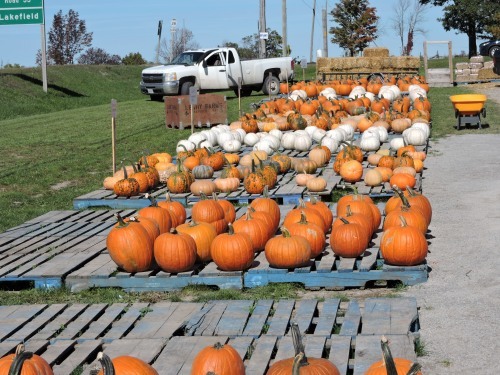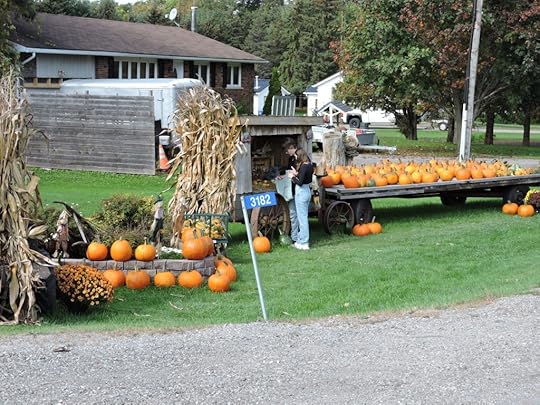Harvest
Harvest is in full swing. Rusty-gold swaths of soybeans, interspersed with vast fields of corn stretch over hill and dale. Farmer’s stands groan under the weight of bushels of tomatoes, baskets of cucumbers, piles of squash, pumpkins, beans, corn and potatoes. Only stubble remains where giant combines rumbled through fields of wheat and oats and barley.

Throughout the Scriptures, God challenges us to bring forth a harvest of righteousness. “Peacemakers who sow in peace raise a harvest of righteousness.”[1] The book of Hebrews promises a “harvest of righteousness and peace.”[2] Paul writes to the Corinthians that God “will enlarge the harvest of your righteousness,” unless they sow sparingly.[3]
How can we prepare for a harvest of righteousness? Like a farm harvest, a spiritual harvest depends on good soil, good seed, a hard-working farmer, and the participation of skilled harvesters. Read Matt. 25:31-46.

The good soil, in this analogy, expresses a different lesson that the soil in Jesus’ parable of the sower. It pictures the need for righteous character. In the Sermon on the Mount Christ calls us to adopt heart attitudes that prepare us for an abundant harvest: humility, sensitivity to sin, meekness, hunger and thirst for righteousness, compassion, purity of motive, a peacemaking spirit, and stamina in the face of persecution. Paul describes the fruit produced by the Spirit in a righteous person as: love, joy, peace, patience, gentleness, goodness, faith, meekness, and self-control. Both the beatitudes and the fruit of the Spirit define Christ-like character. How can we expect God to reap a good harvest if pride, impatience, and selfishness warp our characters?
Second, a good spiritual harvest depends on the sowing of the genuine seed of the gospel. Whether or not we have evangelistic skills, all of us can participate in some way in sowing the seed. That involves preparing ourselves with an understanding of the gospel. “Always be prepared to give an answer to everyone who asks you to give the reason for the hope that you have.”[4] People who display righteous character, including a hopeful outlook, create curiosity. Curiosity provokes questions. When someone asks us about what we believe or why we react with hope in times of stress, we have an opportunity to plant gospel seed.
Third, a good harvest depends on careful attention to the growing crop. Farmers who expect a good harvest stay close to their fields. They labor long and hard, fertilizing, cultivating, and weeding. Believers who long for a harvest of souls stay involved in the lives of their neighbors, friends, and acquaintances. Knowing that we often grow weary, Paul encourages us not to give up. “Let us not become weary in doing good, for at the proper time we will reap a harvest if we do not give up. Therefore, as we have opportunity, let us do good to all people, especially to those who belong to the family of believers.”[5]
Paying close attention to the field in which God places us—the people in our lives—leads us to do good whenever we have an opportunity. We should give especial priority to helping those in the family of God. The kind acts we do enrich our communities, preparing them for a good harvest. These deeds, however, must issue from a humble heart and not be attempts to impress others with our piety. The parable of the sheep and goats in Matthew 25 commends those who did good without conscious thought. The parable specifically mentions feeding the hungry, clothing the destitute, visiting the sick and imprisoned, and showing hospitality to foreigners. But many other activities could also be mentioned. Jesus taught that even offering a cup of cold water was significant in God’s sight.
Finally, we must remember that, at the harvest, all who participate will reap benefits, not just those with the gift of evangelism—soul winners. “We have different gifts according to the grace given us.”[6] Some will sow and others will cultivate the soil. Some will water the crop and still others conduct the harvest. “Neither he who plants nor he who waters is anything, but only God, who makes things grow. The man who plants and the man who waters have one purpose and each will be rewarded according to his own labor. For we are God’s fellow workers.”[7]
What if our lives produce no harvest? Scattered up and down the country roads, lie fields choked by weeds—thistles and golden rod and vetch and ragweed. Fields where no effort was expended. No plowing. No disking. No sowing. No cultivating. No fertilizing. So unlike the fields tended by hard-working farmers. Sadly, some will stand before the judgment seat of Christ with no fruit to offer him.
Heavenly Father I pray there might be a harvest of righteousness from my life. Strengthen me so I can labor tirelessly in the field in which you have placed me. Help me to show interest in my neighbors, colleagues, family, and friends without being nosey or intrusive. Show me when and how to offer practical and compassionate help. Help me not to be afraid to testify to your grace. Arouse curiosity among my acquaintances that moves them to ask about my faith. Enable me to declare the gospel in understandable and interesting ways. Make my life fruitful.
(Let me know your thoughts on this subject. If you appreciate this blog, please pass it on. If I can help you spiritually, let me know. Further articles, books, and stories at: Facebook: Eric E Wright Twitter: @EricEWright1 LinkedIn: Eric Wright ; Eric’s books are available at: https://www.amazon.com/Eric-E.-Wright/e/B00355HPKK%3Fref=dbs_a_mng_rwt_scns_share)
Watch for the reprinting of this devotional classic.
[1] James 3:18
[2] Heb. 12:11
[3] See 2 Cor. 9:6,10
[4] 1 Peter 3:15
[5] Gal. 6:9,10
[6] Rom. 12:6
[7] 1 Cor. 3:7-9



